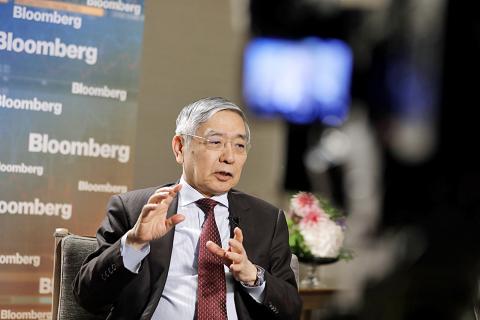The Bank of Japan (BOJ) can deliver more big monetary stimulus if necessary, but needs to take care with its side effects on the financial system, Governor Haruhiko Kuroda said.
The BOJ would ease further if momentum toward its 2 percent inflation target is lost, Kuroda said in an interview with Bloomberg TV’s Kathleen Hays in Fukuoka, Japan, where central bankers and finance chiefs from G20 nations met over the weekend.
The governor said the BOJ does not need to act now, citing the health of the Japanese economy.

Photo: Bloomberg
Kuroda’s comments come after US Federal Reserve Chairman Jerome Powell signaled a willingness to act if the US economy needs it, while European Central Bank President Mario Draghi vowed to support growth and People’s Bank of China Governor Yi Gang (易綱) told Bloomberg in a separate interview that he has “tremendous” policy options to stoke demand.
“Like Mario Draghi, I think we can do these things if necessary,” Kuroda said.
While economic growth data released yesterday provides some support to Kuroda, inflation is still less than halfway to his goal and investors question whether the BOJ’s ultra-aggressive stimulus program is sustainable.
The BOJ’s program compromised the bond market’s function for pricing risk and low yields are squashing profits at commercial banks.
Asked if the BOJ still has the capacity to do “something big,” Kuroda said: “I think so.”
He cited four policy options: cutting the minus-0.1 percent rate further, lowering the target for 10-year yields, increasing the monetary base or boosting asset purchases.
“If the momentum to our 2 percent inflation target is lost, then of course, the Bank of Japan will swiftly respond by changing our policy,” Kuroda said.
The yen weakened immediately after publication of the governor’s remarks, falling to as low as ¥108.68 per US dollar.
Kuroda said the BOJ’s policy options would depend “particularly’’ on what is happening in financial markets.
The Fed is increasingly expected to cut rates this year, a move that would likely strengthen the yen. This has prompted more BOJ watchers to see additional easing as the central bank’s next move, given that a weak yen helps Japan’s efforts to spur inflation.
JPMorgan Chase & Co last week said that it now expects the BOJ to lower its negative interest rate to minus-0.3 percent in September.
In the interview, Kuroda said that he sees two areas of “potential risks” when it comes to side effects of BOJ monetary policy: The first is low yields pushing commercial banks into risky areas to find returns and the second is compromising their role as financial intermediaries.
“We may combine various monetary tools” to reduce harm, he said.
The BOJ is watching the employment market closely because it can have a big influence on inflation, Kuroda said, adding that the plan to raise the sales tax in October is understandable and the government has prepared measures to offset any negative effects.

Taiwanese suppliers to Taiwan Semiconductor Manufacturing Co. (TSMC, 台積電) are expected to follow the contract chipmaker’s step to invest in the US, but their relocation may be seven to eight years away, Minister of Economic Affairs J.W. Kuo (郭智輝) said yesterday. When asked by opposition Chinese Nationalist Party (KMT) Legislator Niu Hsu-ting (牛煦庭) in the legislature about growing concerns that TSMC’s huge investments in the US will prompt its suppliers to follow suit, Kuo said based on the chipmaker’s current limited production volume, it is unlikely to lead its supply chain to go there for now. “Unless TSMC completes its planned six

Power supply and electronic components maker Delta Electronics Inc (台達電) yesterday said second-quarter revenue is expected to surpass the first quarter, which rose 30 percent year-on-year to NT$118.92 billion (US$3.71 billion). Revenue this quarter is likely to grow, as US clients have front-loaded orders ahead of US President Donald Trump’s planned tariffs on Taiwanese goods, Delta chairman Ping Cheng (鄭平) said at an earnings conference in Taipei, referring to the 90-day pause in tariff implementation Trump announced on April 9. While situations in the third and fourth quarters remain unclear, “We will not halt our long-term deployments and do not plan to

‘SHORT TERM’: The local currency would likely remain strong in the near term, driven by anticipated US trade pressure, capital inflows and expectations of a US Fed rate cut The US dollar is expected to fall below NT$30 in the near term, as traders anticipate increased pressure from Washington for Taiwan to allow the New Taiwan dollar to appreciate, Cathay United Bank (國泰世華銀行) chief economist Lin Chi-chao (林啟超) said. Following a sharp drop in the greenback against the NT dollar on Friday, Lin told the Central News Agency that the local currency is likely to remain strong in the short term, driven in part by market psychology surrounding anticipated US policy pressure. On Friday, the US dollar fell NT$0.953, or 3.07 percent, closing at NT$31.064 — its lowest level since Jan.

The New Taiwan dollar and Taiwanese stocks surged on signs that trade tensions between the world’s top two economies might start easing and as US tech earnings boosted the outlook of the nation’s semiconductor exports. The NT dollar strengthened as much as 3.8 percent versus the US dollar to 30.815, the biggest intraday gain since January 2011, closing at NT$31.064. The benchmark TAIEX jumped 2.73 percent to outperform the region’s equity gauges. Outlook for global trade improved after China said it is assessing possible trade talks with the US, providing a boost for the nation’s currency and shares. As the NT dollar